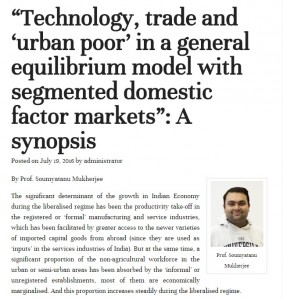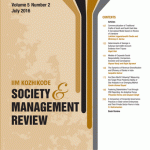CONSUMER PERCEPTION ON APPS FOR BOOKING TAXI SERVICES & ITS IMPACT ON THE INDIAN E–COMMERCE SECTOR
By:


Sumit Wagmare Rajul Yadav Gaurav Jatin Choudhary
Recently, in March 2015, the Delhi Government, in its letter to the Department & Telecommunication, Government of India, Sought blocking of App based booking services offered by M/s Uber, OLA Cabs, and Taxi For Sure companies respectively. This request was the aftermath of an unfortunate incident in which the Uber Driver was found guilty of putting the passenger’s life at risk.
On the other side, this move has been strictly criticised by the investors as they argue that such a ban would weaken the positive sentiment around the internet economy in India. The very evidence of this argument can be justified from the fact that start-ups cab companies like OLA cabs & Taxi for Sure have raised about $350 million between them, whereas Uber has managed to raise $1.2 million in last financial year.
But, what is the consumer’s perception about these Apps based booking services? Which factors affect its Acceptance / Rejection? Our recent study on this topic involved a survey of over 70 respondents who had a prior experience of using these apps based hiring services. The respondents suggested that Perceived Ease of Use, Subjective Norms & Perceived Risk played an important role in shaping the behavioural intention to use the app.
Traditionally, before the introduction of Apps, Taxi hiring services were provided through Kiosks located at important landmarks (e.g. Airports) or through Telephone Booking. This system was a major breakthrough for the hiring location based services as it eliminated the extra burden of bargaining your fare with the taxi driver. Because now a customer would posses ready information about the total distance to be travelled as well as minimum fare expected.
Besides the Perceived Price Level, the value that an App adds to your life plays an underlying inherent role in using the App. It generates a sense of freedom, creates a feeling of independence & royalty among the users.
The main target segments here in the case are Students perceiving higher Education as well Corporate working professional who are the heavy users of these Apps. With a Rapid boost in the Smartphone industry in the past decade, it would be rather inevitable to imagine life without app based services for perusal.
Considering the facts about boost in E-Commerce as well as the growing Indian economy, as a part of our study we have recommended the management owning Taxi Services that, they should design their App in such a manner that it is User Friendly, convenient to use, provides all complete details of the concerned taxi driver (his registration no., phone no, licence no. Etc, exact fares, total fares i.e. the App should propagate transparency of information. Also, word of mouth publicity is more important to promote the use of such apps. Viral marketing is a new advent for housing these techniques.
To conclude, there are advantages & disadvantages associated with usage of Apps for booking services. Nevertheless, every company has some or the other time faced such situation in which Passengers have given up the trust in their services, which is exactly similar to what is happening to Uber in India. It is up to the Government to construct proper rules & impose regulations to regulate the businesses of these firms so as to ensure customer satisfaction as well as expand E-Commerce growth in India.
The authors are PGP students at IIM Kozhikode. The work was done under the supervision of Prof. Naveen Amblee, Assistant Professor of Marketing at IIM Kozhikode. Views expressed here are their personal views.















 Users Today : 386
Users Today : 386 Users Yesterday : 686
Users Yesterday : 686 This Month : 8439
This Month : 8439 This Year : 8439
This Year : 8439 Total Users : 566683
Total Users : 566683 Who's Online : 4
Who's Online : 4